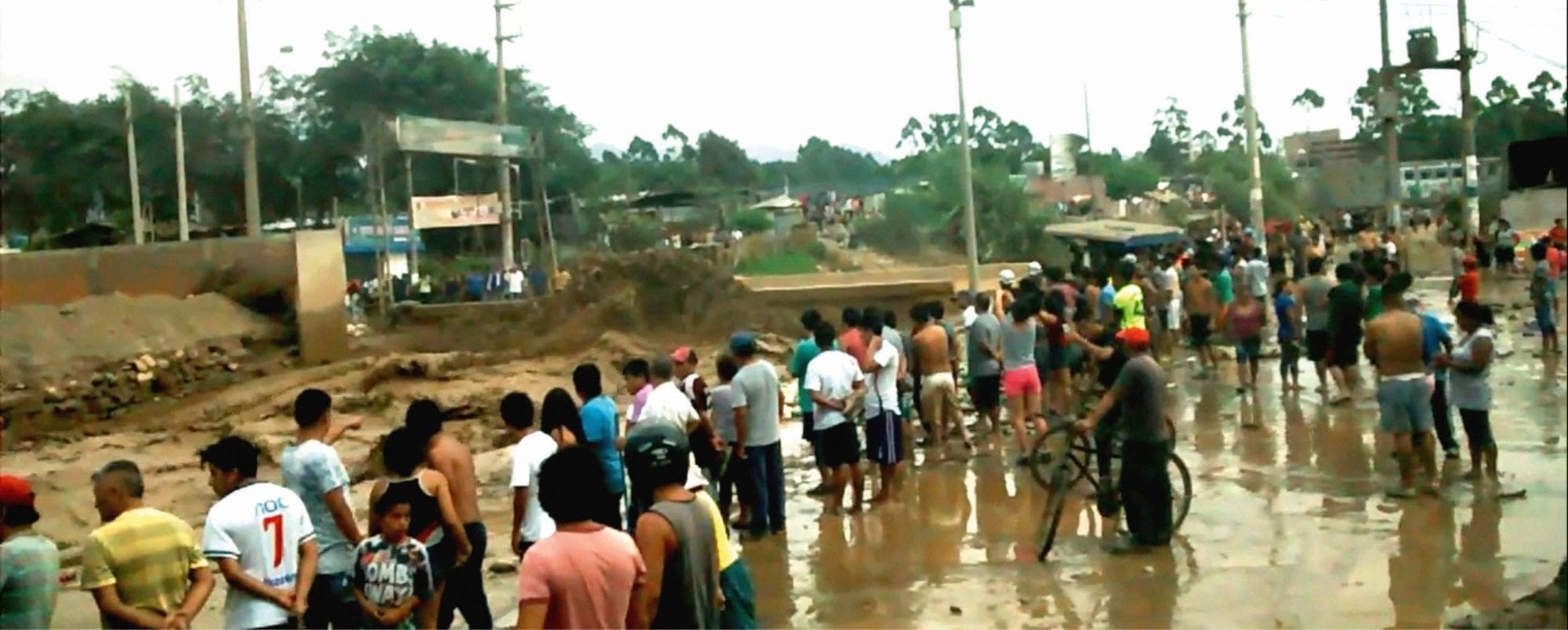
Mar 23, 2017
Racing to help the more than 640,000 people affected by massive flooding along coastal Peru, trade unions, faith-based organizations, academic institutions and other civil-society organizations have mobilized to ensure lifesaving supplies and other items reach affected communities.
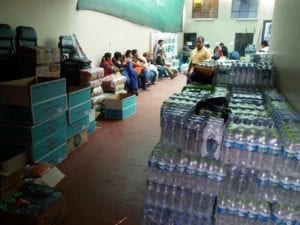
Cerro Verde mine workers union in Arequipa collect goods to donate to flood victims. Credit: Rommel Arenas
Since December, two dozen provinces in Peru have witnessed a period of intense rains and destructive mudslides that have killed 75 people, affected 157,000 homes, inundated hundreds of acres of farmland and destroyed 1,100 miles of public roadways and 159 bridges. The Peruvian government is working to clear roadways and affected areas of debris. Infectious diseases spread by mosquitos, including dengue and Zika, are now an increasing concern for communities where standing water is an issue. The Peruvian National Weather Service has projected that the rains will continue through the first week of April.
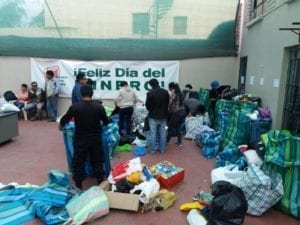
A range of unions in Peru are providing assistance to workers and their families displaced from recent flooding. Credit: Rommel Arenas
The National Federation of Textile Workers, FED-CUT (healthcare workers federation), confederations such as the Peruvian General Workers Confederation (CGTP), the National Federation of Peruvian Textile Workers and local unions in the mining sector in Arequipa are collecting drinking water, non-perishable food, clothing and other basics for their members and affected communities. Unions are slowly beginning to distribute assistance as roads become passable. The Peruvian Federation of Civil Construction Workers (FTCCP) has led rebuilding efforts of homes in Lima.
Workers Will Suffer Economic Hardships after Floods
The disaster will have long-term impact on workers, said Samantha Tate, Solidarity Center Peru country program director.
“For example, farm workers in La Libertad, one of the areas hardest hit, cannot go to work because there is no way to get to their workplaces or move product. These workers—who don’t make a decent wage as it is—are not being paid at all now,” she said. “Meanwhile the prices of food and consumer goods have increased because of reduced supply and price gouging. This is a disaster that will have the ripple effects of increased poverty, hunger and isolation for Peruvians outside of Lima.”
Flooding is not a new phenomenon on the Peruvian coast, however rains have intensified over recent years. Many of the most affected provinces have budgets for disaster risk reduction, prevention and relief. However a recent investigation shows that much of the funding to mitigate life-threatening natural disasters has gone unspent.
Send Donations to Red Cross in Peru
The CGTP is blaming corruption and indifference for the loss of life, widespread damage, lack of basic services and scarcity of food, water and medicines in affected areas. In a statement, the CGTP demands that the national government sanction local authorities who did not address their region’s vulnerability to flooding and put their citizens at grave risk. The confederation also calls for tax breaks for the wealthiest individuals and companies—such as exemptions for the mining industry—to end and the immediate collection of past-due corporate tax debt to help pay for a speedy recovery.
The Solidarity Center encourages anyone interested in helping to donate to the Red Cross in Peru and will announce later If Peruvian unions seek additional funding for their relief efforts.
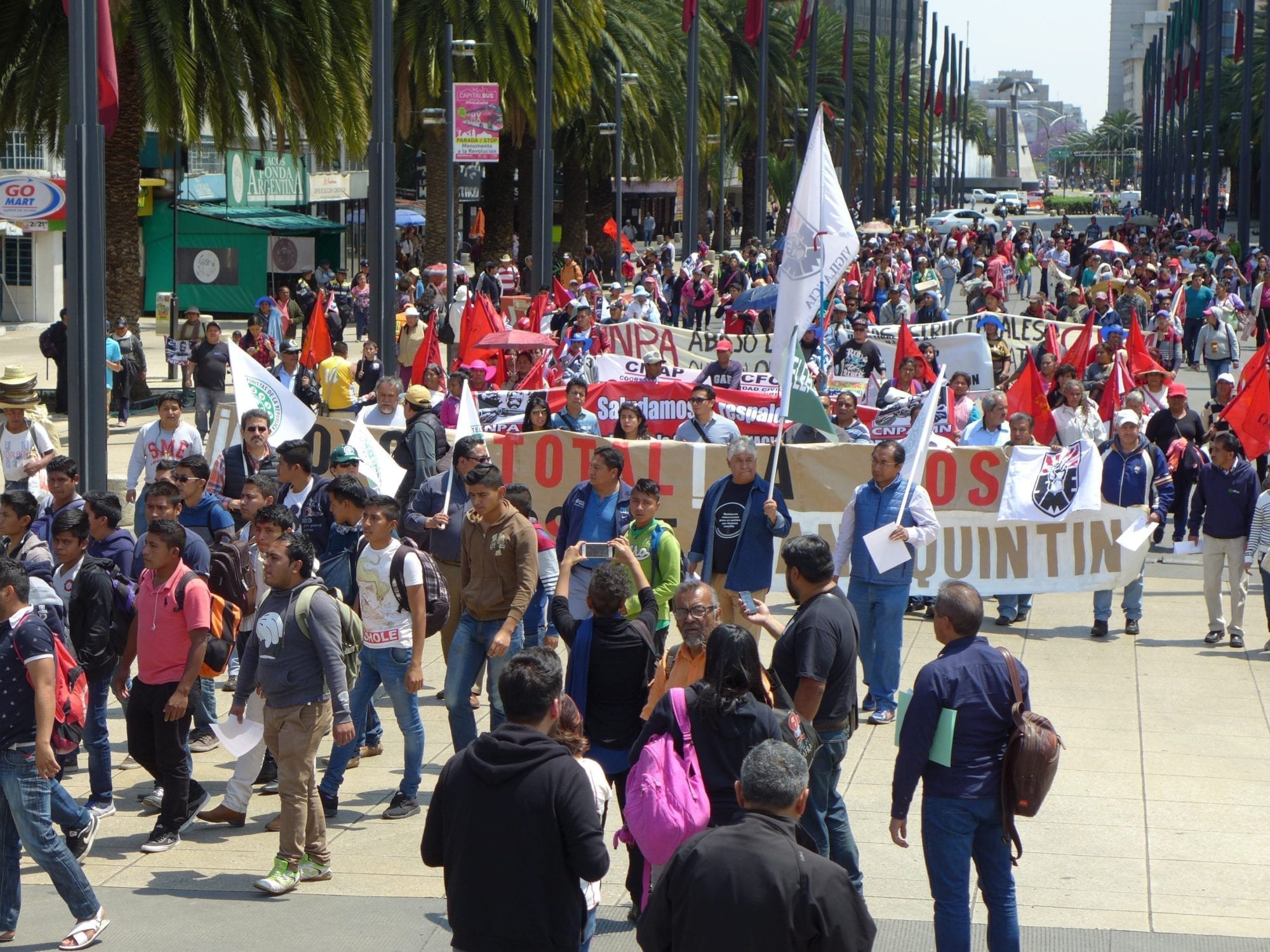
Mar 21, 2017
Dozens of day-labor farm workers (jornaleros) demanded improved wages, democratic representation, an end to sexual harassment and access to clean water as they marched across Mexico in a national caravan, “Fair Wages and Dignified Life.”
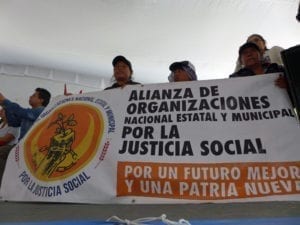
A proposed new law would make it much harder for farm workers to get compensation for job injuries. Credit: Solidarity Center/Gladys Cisneros
The workers, who left Baja California March 4 and arrived in Mexico City on March 17, sought to raise renewed awareness of their struggle for decent working conditions in the San Quintin Valley and hold employers accountable for their failure to uphold agreements reached in 2015. Although the settlement negotiated in 2015 included raising day wages to between 150 and 180 pesos (approximately $7 to $9), these wage levels have been unevenly applied.
“We are here to demand the same things we have been asking for, for two years,” says Lorenzo Rodriguez, general secretary of the SINDJA union.
Following the 2015 jornaleros strike, workers formed a national independent union that has grown to include farm workers from four Mexican states. Registering their independent union, SINDJA, is the only demand that has been met so far, say union leaders. Workers negotiated the agreement with the government, but the agribusiness owners and growers must comply.
“We don’t even have the right to live,” says farm worker leader Bonifacio Martinez. “And with proposed new government reforms, we are forbidden to get sick at work,” he adds, referring to proposed legislation that would place government and employers, not medical professionals, in charge of determining whether an injury is work-related.
A 2015 Los Angeles Times series found many workers on export-oriented farms “essentially trapped for months at a time in rat-infested camps, often without beds and sometimes without functioning toilets or a reliable water supply.”
The national caravan included families of the 43 disappeared students of Ayotzinapa, who continue to seek answers and justice. The march coincided with the two-year anniversary of a historic 12-week strike and popular mobilization in the San Quintin Valley.
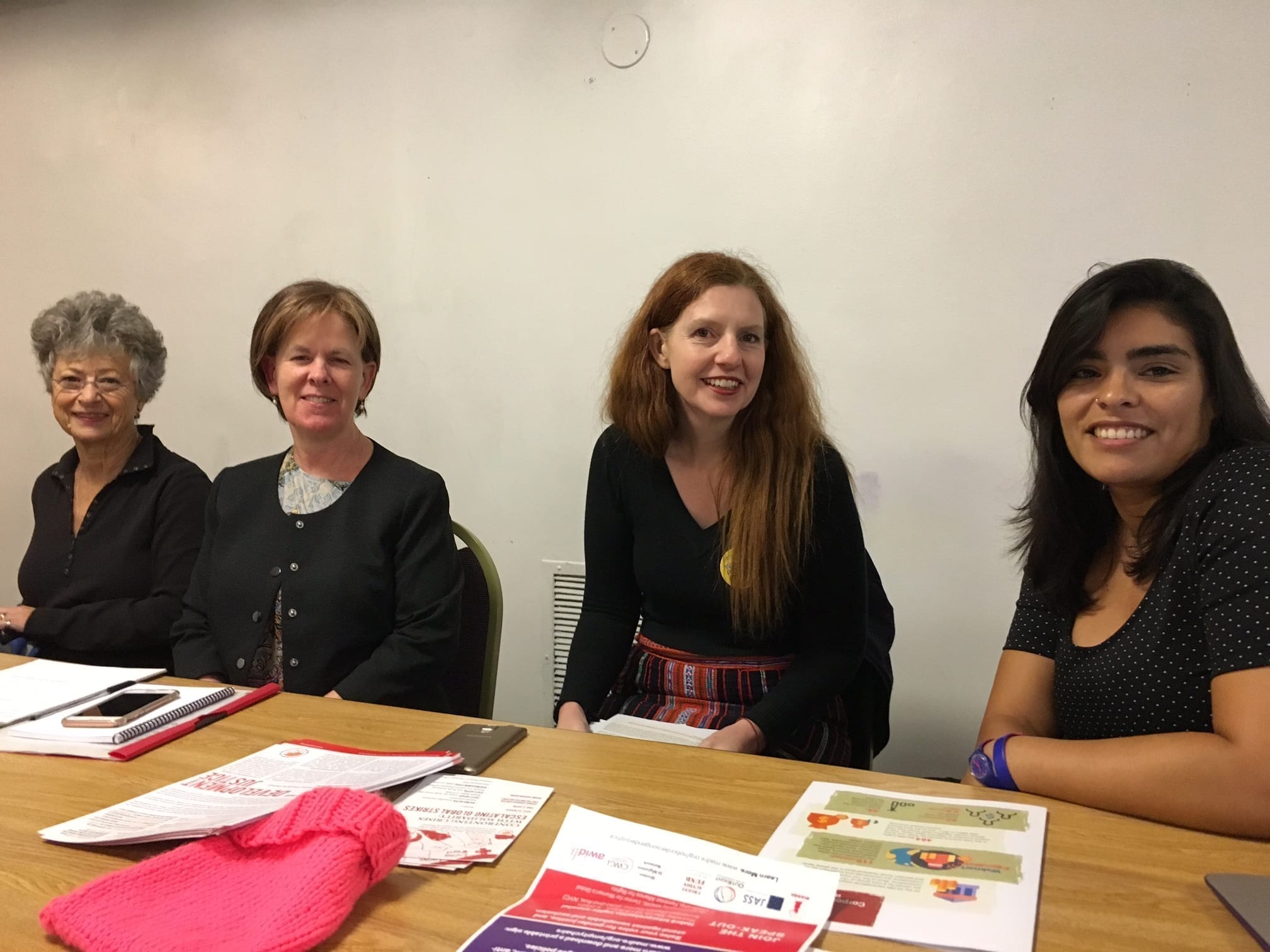
Mar 17, 2017
Understanding the scale and depth of corporate power’s impact on workers, the environment and public services—and channeling that knowledge into joint action to coordinate and maximize an effective response—is crucial to decreasing economic inequality and reclaiming space for the 99 percent, panelists said yesterday in New York City.
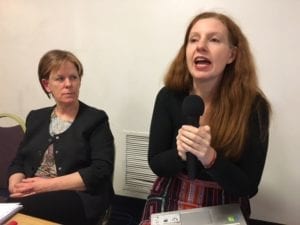
“Our solidarity is what’s important in addressing global power”—Kate Lappin, APWLD. Credit: Solidarity Center/Tula Connell
“Our solidarity is what’s important in addressing global power,” said Kate Lappin, regional coordinator of the Asia Pacific Forum on Women, Law and Development (APWLD). “The answer is not about blaming migration or ‘the other,’ the answer is solidarity,” Lappin said, speaking at “Impact of Corporate Power on Women’s Economic Empowerment,” a session sponsored by the Association for Women’s Rights in Development (AWID), Solidarity Center, APWLD and Global Policy Forum.
The panel was one of several sessions the Solidarity Center and its partners held in conjunction with the March 13–24 meeting of the United Nations Commission on the Status of Women (CSW). Some 200 union women activists from around the globe are taking part in events.
The panel stems from the 2016 report, “Challenging Corporate Power: Struggles for Women’s Rights, Economic and Gender Justice” produced by AWID and the Solidarity Center, in conjunction with Just Associates (JASS). The report explores how corporations in collusion with elites and other powerful actors are exerting their power to transform economic and political systems. The report then illustrates how this power impacts women and oppressed peoples.
Earlier this week, the Solidarity Center and International Trade Union Confederation (ITUC) convened sessions examining the prevalence of gender-based violence at work and mobilization strategies for championing passage of an International Labor Organization (ILO) convention preventing gender-based violence on the job. Yesterday, three women union activists shared their experiences helping women form unions at the AFL-CIO panel, “Building Power for Women Workers in the Changing World of Work.”
Workers Have Power because Their Labor Fuels Economy
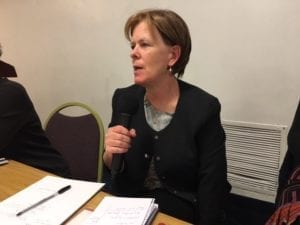
The labor movement and women’s movement have a lot to learn from each other—Lisa McGowan, Solidarity Center. Credit: Solidarity Center/Tula Connell
One of the most promising areas of cross-movement collaboration is the campaign to end gender-based violence at work, said Solidarity Center Gender Equality Director Lisa McGowan.
“It’s a really powerful issue—it helps bring together lots of different movements, primarily the labor and women’s movements—who have a lot to learn from each other,” said McGowan.
Last fall, the Solidarity Center held a multi-session workshop on building alliances around ending gender-based violence at work during the AWID Forum in Brazil, part of the Solidarity Center’s outreach efforts to connect with women’s movements and other likeminded allies around the issue. More than 2,000 women activists from around the world attended the AWID event.
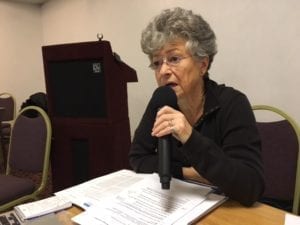
“Of the 100 largest economies today, 31 are countries”—Barbara Adams, Global Policy Watch. Credit: Solidarity Center/Tula Connell
Barbara Adams, senior policy adviser at the Global Policy Forum, discussed how growing economic inequality is hitting women workers especially hard, as wages decline along with women’s ability to exercise their rights.
Describing the increasing influence of corporate money on governments, which often contract out public services to less accountable private-sector providers, Adams said the stated goal of some corporate players is “governance without government.
“Of the 100 largest economies today, 31 are countries,” she said. “It’s no longer one person, one vote, but one dollar, one vote.” Unlike governments, corporations cannot be held accountable through the democratic process.
The role of the union movement is especially key in such an environment, said McGowan. “Workers have power because their labor is what fuels our economy,” she said.
Building on worker power in relation to corporations, the challenge for all progressive allies is to link the movements and link the strategies, she said.
Feminist Futures: Building Collective Power for Rights and Justice

Ana Abelenda, AWID, described the cross-movement dialogue behind “Challenging Corporate Power.” Credit: Solidarity Center/Tula Connell
Ana Abelenda, AWID economic justice coordinator and panel moderator, described the process behind the “Challenging Corporate Power” report, which is based on a 2016 cross-movement dialogue convened by AWID and the Solidarity Center. Facilitated by JASS in São Paulo, Brazil, the meeting brought together women trade unionists; women workers; feminists; indigenous and black women; lesbian, bisexual, trans, queer and intersex (LBTQI) activists; and women human rights defenders to discuss, debate and share understanding of corporate power and what it means to their struggles and their lives.
The report reflects the participants’ explorations of successful movements to demand accountability—for labor rights violations, ecological damage, trade liberalization and privatization. Women beer promoters in Cambodia, for example, are increasingly forming unions with the Cambodian Food Service Workers Federation (CFSWF) to protest poverty wages, sexual harassment and violence, long working hours and toxic working conditions in bars and restaurants.
CSW meetings this month involve hundreds of high-level government delegates who, for the first time, are discussing women’s economic empowerment and the role of labor unions as core to achieving women’s rights—a huge milestone for working women around the globe in achieving recognition of their workplace struggles by the world’s human rights body—and one that worker rights organizations like the ITUC and Solidarity Center have long championed.
Check out our coverage of this week’s events on Facebook and on Twitter @SolidarityCntr.
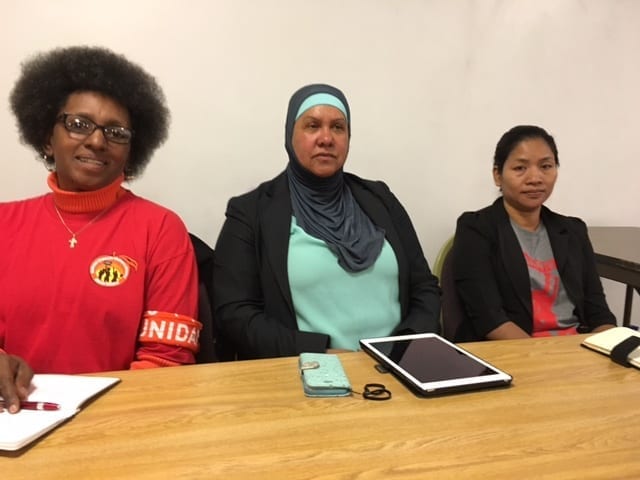
Mar 15, 2017
Women’s economic empowerment is linked to achieving broader labor rights for workers around the globe and women must join together no matter what their interests or jobs to bring about gender equality at work, panelists said today at an AFL-CIO panel in New York City.
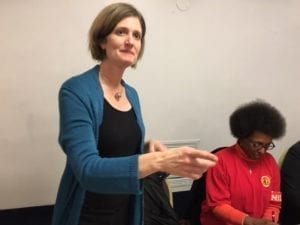
AFL-CIO International Affairs Director Cathy Feingold moderated the panel “Building Power for Women Workers in the Changing World of Work.” Credit: Solidarity Center/Tula Connell
“We’re not talking about ‘women’s rights’ and ‘worker rights’—it’s one agenda that we need to bring together so we really can have women’s economic power in the world of work,” said AFL-CIO International Affairs Director Cathy Feingold, who moderated the panel. “We cannot be divided.”
Three union activists shared their experiences in helping women achieve a voice at work during “Building Power for Women Workers in the Changing World of Work.” The panel is one of several sessions the Solidarity Center and its partners are holding in conjunction with the March 13–24 meeting of the United Nations Commission on the Status of Women (CSW).
On Monday, the Solidarity Center and International Trade Union Confederation (ITUC) held panels examining the prevalence of gender-based violence at work and mobilization strategies for championing passage of an International Labor Organization (ILO) convention preventing gender-based violence on the job.
‘We Women Have to Do It’
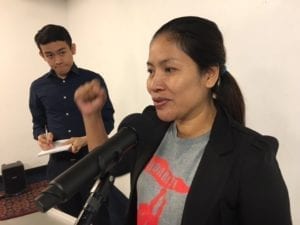
“We cannot wait for men to help us. We women have to do it”—Sophorn Yang, Cambodian garment worker organizer. Credit: Solidarity Center/Tula Connell
Sophorn Yang, a garment worker organizer in Cambodia, fired up the dozens of union activists and allies in the audience when she said,
“I’m happy to be here in room full of woman power!”
Yang discussed garment workers’ long struggle for decent wages, including a series of massive demonstrations in 2015 and 2016 in which several garment workers were killed by police and others beaten and arrested.
An estimated 700,000 workers in Cambodia sew and package more than $5 billion worth of clothing, textiles and shoes every year, nearly all on short-term contracts that make it easier to fire and control workers.
Yet even though nearly all garment workers are women, Yang said she is constantly challenged by male union leaders.
“In my country, the majority of leaders undermine my values because I am a woman,” Yang said, speaking through a translator. “They don’t know I have the will power to fight, especially in a sector where 90 percent of women workers are underrepresented, are under attack.
“We cannot wait for men to help us. We women have to do it.”
‘Organize, Build Coalitions, Work in Cooperation’
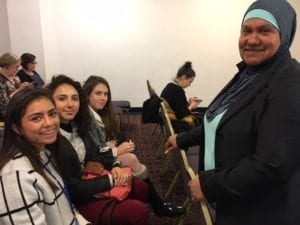
“There are more things we have in common than what divides us”—Sussie Lozada, UNITE Local 100 political director. Credit: Solidarity Center/Tula Connell
Two union activists from the United States emphasized the importance of organizing workers, joining with allies and reaching women in all job sectors and interests to build networks to strengthen women’s struggles on the job.
“We have the power to organize,” said Sussie Lozada, political director of UNITE Local 100. “Organize, build coalitions, work in cooperation—all are fundamental for us to grow and get what we want.
“There are more things we have in common than what divides us.”
Patricia Sauls, a domestic worker and leader of the Atlanta chapter of National Domestic Workers Alliance (NDWA), said joining a union empowered her to believe she could make positive change at work for herself and for other domestic workers.
“My union encouraged me to believe I do have a voice,” she said, telling participants that she was speaking publicly for the first time. “I am just so grateful for the sisterhood that is here to support me and stand by me.”
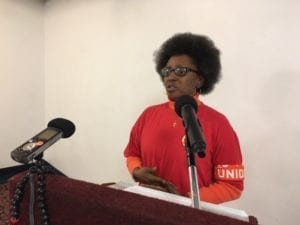
“My union encouraged me to believe I do have a voice”—Patricia Sauls, NDWA activist. Credit: Solidarity Center/Tula Connell
Sauls is part of a global delegation sponsored by the International Domestic Workers Federation (IDWF), which is mobilizing members around issues like preventing gender-based violence at work.
Joining the panel from different continents and diverse experiences, Sauls and Yang carried similar messages for their union sisters:
“We can win if we stay together and support each other,” said Sauls.
And as Yang said, “We need to come together to organize and fight, with passion, with real passion!”
Hundreds of high-level government delegates at the CSW for the first time are discussing women’s economic empowerment and the role of labor unions as core to achieving women’s rights—a huge milestone for working women around the globe in achieving recognition of their workplace struggles by the world’s human rights body—and one that worker rights organizations like the ITUC and Solidarity Center have long championed.
Follow us here, on Facebook and on Twitter @SolidarityCntr for coverage of our final event on Thursday, “Impact of Corporate Power to Women’s Economic Empowerment,” a panel sponsored by the Association for Women’s Rights in Development (AWID) and Solidarity Center.
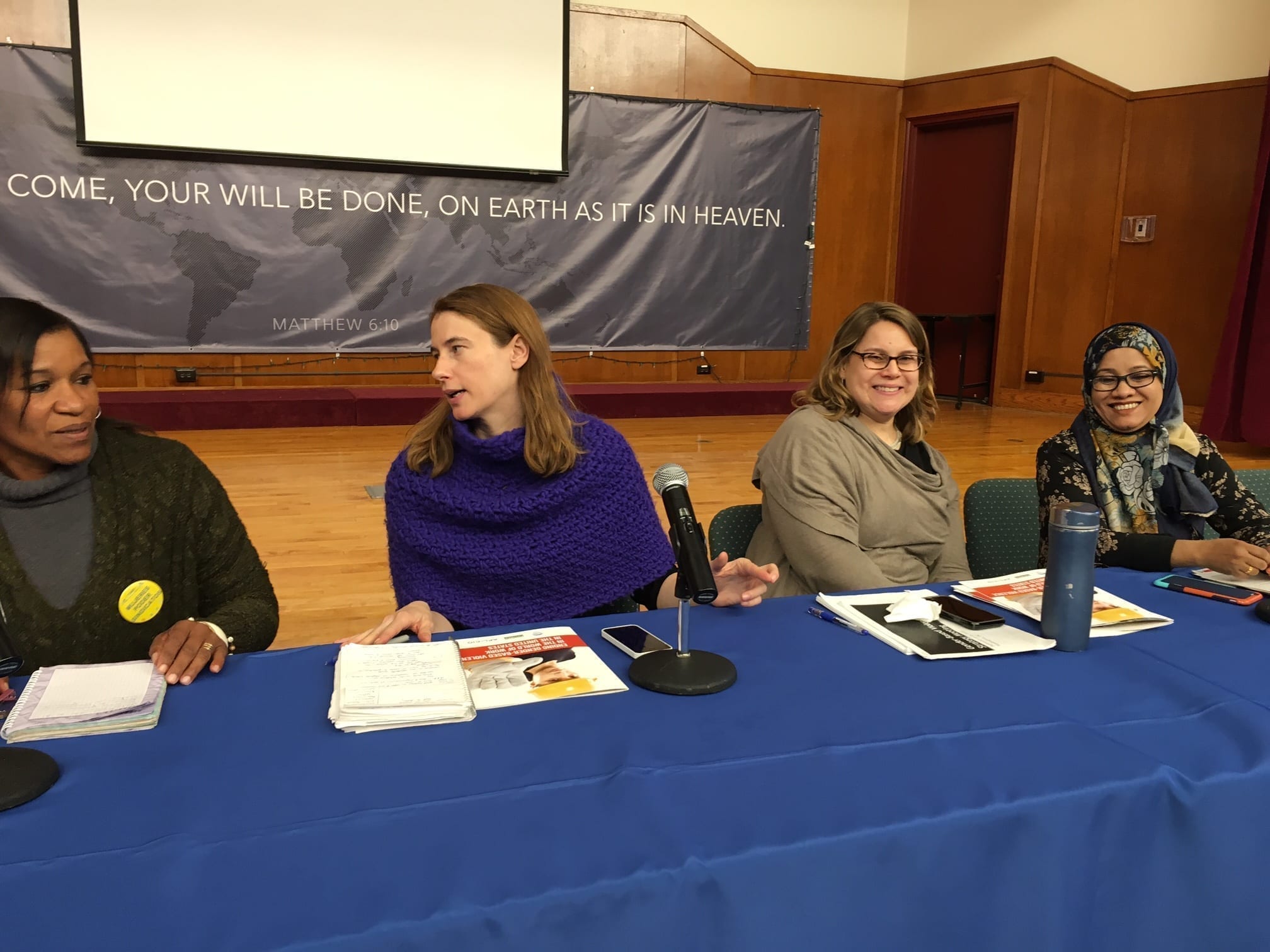
Mar 14, 2017
Gender-based violence at work is far more prevalent than reported and ending it will require women coming together to challenge male-dominated structures—whether in corporations, governments or their own unions, according to leaders and experts from a variety of unions and nongovernmental associations (NGOs) speaking yesterday in New York City.

“As prevalent as gender-based violence is in workplace, it goes unrecognized—Solidarity Center Policy Director Molly McCoy. Credit: Solidarity Center/Tula Connell
“As prevalent as gender-based violence is in workplace, it goes unrecognized,” said Solidarity Center Policy Director Molly McCoy.
McCoy was among participants on two panels Monday that focused on gender-based violence at work, part of events the Solidarity Center and its partners are holding in conjunction with the March 13–24 meeting of the United Nations Commission on the Status of Women (CSW).
Hundreds of high-level government delegates at the CSW will for the first time discuss women’s economic empowerment and the role of labor unions as core to achieving women’s rights—a huge milestone for working women around the globe in achieving recognition of their workplace struggles by the world’s human rights body—and one that worker rights organizations like the ITUC and Solidarity Center have long championed.
Gender-Based Violence Worse without Freedom to Form Unions
Panelists at the Solidarity Center session, “Eliminating Gender-Based Violence in the World of Work,” explored how unions enable workers, especially women workers, to speak up when experiencing sexual harassment and other violence on the job by providing a network of peer support.
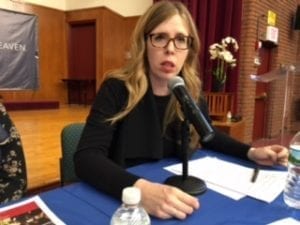
“The absolute most important thing is that we organize for worker power”—Julia Rybak. New York Hotel Trades Council. Credit: Solidarity Center/Tula Connell
“Workers having the resources and the community of support is something most workers don’t have,” said Julia Rybak, director of the New York Hotel Trades Council. “The absolute most important thing is that we organize for worker power.”
“Gender-based violence is always worse when there is no freedom of association,” said McCoy, who moderated the panel. “When workers are not organized (in unions), they don’t have resources to tackle gender-based violence.”
Conversely, McCoy said, “the persistence and prevalence of gender-based violence has an impact on freedom of association. Gender-based violence is very much a tool used to repress worker rights, to silence workers and to isolate workers so they can’t stand up for themselves and fight gender-based violence.”
“There are extraordinarily high rates of gender-based violence against women at the workplace,” said Robin Runge, a lawyer who represented survivors of violence and abuse for more than 20 years. Runge is author of the new report, “Ending Gender-Based Violence in the World of Work in the United States,” written with support from the AFL-CIO and Solidarity Center.
Women Empowering Themselves through Unions
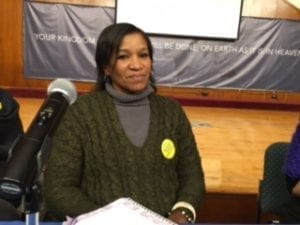
“Only by organizing can we get out of situations I faced when I was 12 and protect other domestic worker”—Ernestina Ochoa Lujan, IDWF. Credit: Solidarity Center/Tula Connell
Several panelists recounted their own experiences with workplace-based violence. Ernestina Ochoa Lujan, a domestic worker and vice president of the International Domestic Workers Federation (IDWF), began work as a domestic worker in Peru at age 11. At age 12, she was attacked by her employer.
“I couldn’t call my parents because I didn’t have parents, I couldn’t call authorities because we are not believed. I cry not because I have no hope but because I went on to organize with my union,” she said through a translator.
“Only by organizing can we get out of situations I faced when I was 12 and protect other domestic workers.”
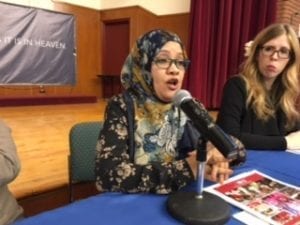
“We have to think about all those workers whose voice is not here”—Kazi Fouzia, DRUM. Credit: Solidarity Center/Tula Connell
Panelists and some of the several dozen audience members who spoke during a question and answer period described widespread violence against women workers—in Algeria, Argentina, Colombia and wherever women work and in whatever sector they are employed.
“We have to think about all those workers whose voice is not here,” said Kazi Fouzia, director of organizing at the New York-based Desis Rising Up and Moving (DRUM) organization, a 4,000-member worker association that includes primarily women in the informal economy.
Join the Stop Gender-Based Violence Campaign
Earlier in the day, 75 participants discussed steps involved in building support for an International Labor Organization (ILO) convention on ending gender-based violence.
“It’s important we go to the governments to make sure they support an ILO convention. We need a critical number of governments to move it forward,” said Marieke Koning from the Equality department at the International Trade Union Confederation (ITUC). The ITUC sponsored the panel, “Stop Gender-Based Violence (GBV) in the World of Work Campaign: How to Support an ILO Convention.”
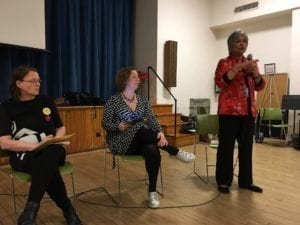
Amrita Sietaram, ILO ACTRAV section, described the process of creating and passing a convention to end gender-based violence at work. Credit: Solidarity Center/Tula Connell
Koning was joined by Amrita Sietaram from the ILO ACTRAV section, who described the process of creating and passing a convention to end gender-based violence at work, which she says has moved forward because of the efforts of the ITUC and global union federations. The ILO will discuss a draft text in June 2018 and unions, employers and others have from May to September this year to comment on the draft text.
Sietaram also described significant “employer resistance to a gender-based violence at work convention,” and noted that discussions will determine whether the final product is a “convention”—which governments agree to follow, or a “recommendation,” a weaker outcome that provides direction.
Speaking from the audience, IDWF General Secretary Elizabeth Tang described how domestic workers around the world worked for years to achieve 2011 passage of ILO Convention 189 covering domestic workers—and how the union has begun to reproduce those steps to move passage of a convention to end gender-based violence at work.
Join the ITUC campaign to end gender-based violence at work.
Follow us here, on Facebook and on Twitter @SolidarityCntr for coverage of the following Solidarity Center and partner events:
- March 15, 12:30 ET: “Building Power for Women Workers in the Changing World of Work”—AFL-CIO
- March 16, 12:30 ET: “Impact of Corporate Power to Women’s Economic Empowerment”—Association for Women’s Rights in Development (AWID) & Solidarity Center





















